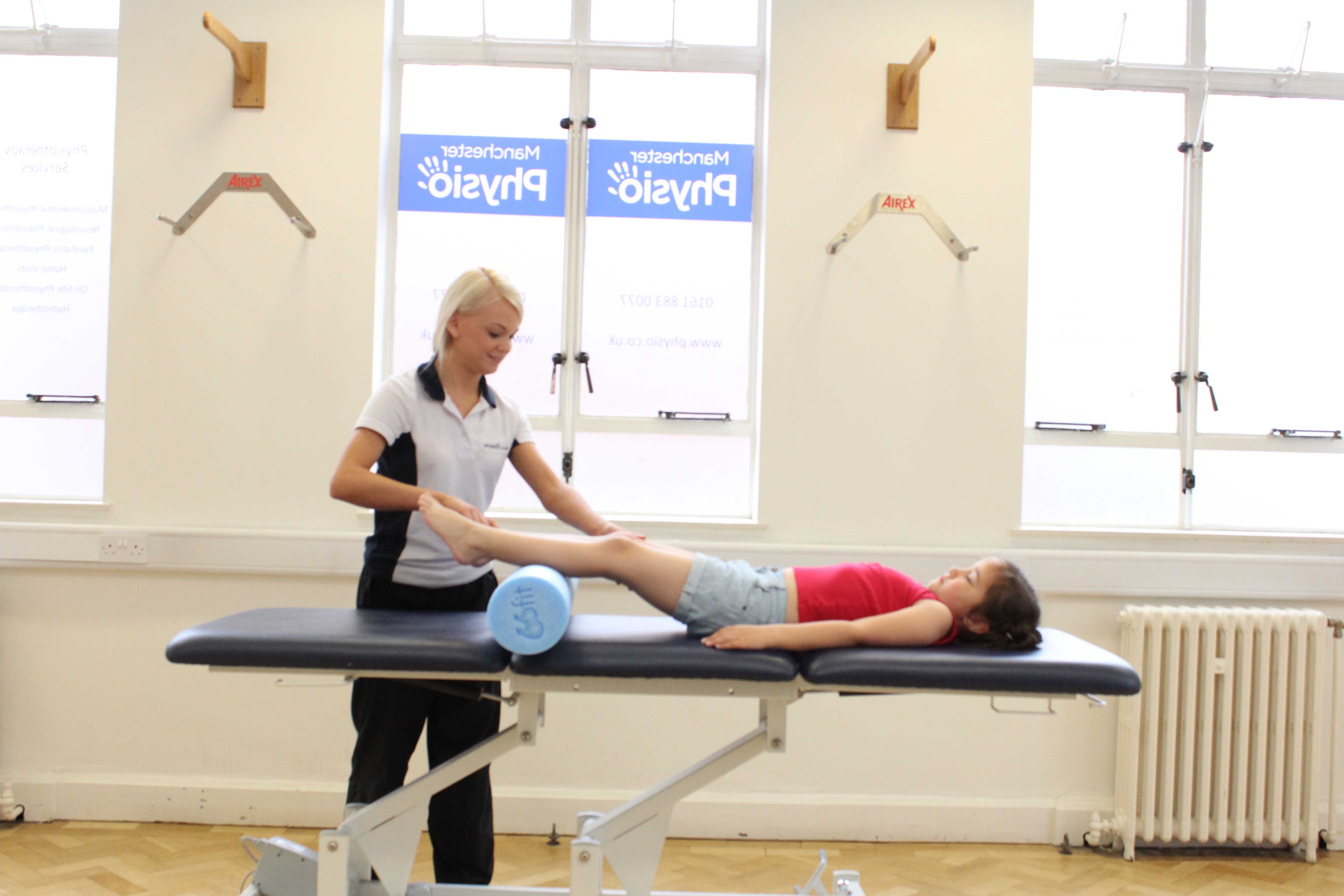 Above: Mobilisations and stretches of the hip, knee and ankle by a paediatric physiotherapist
Above: Mobilisations and stretches of the hip, knee and ankle by a paediatric physiotherapistTypes of chromosomal disorder
The most common type of chromosomal disorder is Down’s syndrome. This is caused by an extra chromosome and the symptoms include low muscle tone, a stocky build, slanting eyes and mild to moderate learning difficulties.
The second most common chromosomal disorder is Edwards’s syndrome. The features of this condition are clenched hands, overlapping fingers and slow motor and cognitive development.
Other chromosomal disorders are Idic15, Jacobsen syndrome, Klinefelter’s syndrome, Patau syndrome, Turner syndrome, XXX and XYY syndrome.
Cause of chromosome disorder
The chromosomal disorder is caused by an error before or during fertilisation of the egg and sperm cell. It is not known why these errors occur. The error results in the wrong number of chromosomes or small pieces of a chromosome being deleted, duplicated or swapped with another chromosome.
Diagnosis of chromosome disorder
Chromosomal disorders can be diagnosed before or after birth using a blood test and analysing the sample under a microscope.
Symptoms of chromosomal disorder
The symptoms depend upon where the error is on the chromosome or how many there are. Common symptoms include impaired cognitive ability, impaired physical development, decreased muscle tone and strength. Individuals often have impaired development of fine and gross motor skills, facial characteristics and structural heart defects at birth.
Treatment of chromosome disorder
There is no cure for a chromosomal disorder. Once your child is born, they will require therapy from a multi-disciplinary team to learn to manage their symptoms.
Physiotherapy for chromosome disorder
Following specialist physiotherapy assessment, a problem list and treatment plan will be formulated. Treatment will be focused on your child’s main problems and will work towards achieving specific functional short and long-term goals. Goals will be discussed at the initial assessment and will depend upon your child’s stage of development. Physiotherapy treatment for a child with chromosomal disorder may focus on:
- Positioning and postural re-education during rest and play
- Mobility – sitting, crawling, standing
- Transfers – rolling over, the transition from lying to sitting
- Muscle strengthening
- Fun and challenging balance and co-ordination activities
- Fine hand dexterity tasks
- Reduction of risk of secondary complications
Children with chromosomal disorders significantly benefit from physiotherapy treatment. The benefits of physiotherapy are:
- Improved ability to move around
- Improved balance and co-ordination
- Increased muscle strength
- Increased hand dexterity
- Improved posture and alignment
- Reduced risk of secondary complications
- Learn how to assist your child’s physical and cognitive development
Why Physio.co.uk for chromosome disorder
At Physio.co.uk, we understand the complex clinical symptoms of a chromosomal disorder. Our specialist physiotherapists are able to provide expert treatment to your child in order to achieve optimum function and quality of life.
- Treatment available immediately
- Treatment at any stage of your child’s development
- Specialist neurological physiotherapists
- Motivated, friendly, caring staff
- Treatment at home or in the clinic
- Provision of home exercise program written specifically for your child
- Access to occupational therapy
- Access to speech and language therapy
- Access to podiatry
- Access to orthotics

 0330 088 7800
0330 088 7800


































